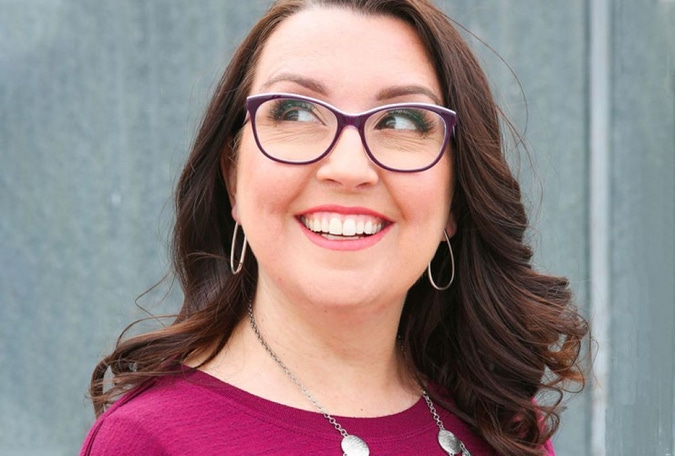10 Women Wellness Entrepreneurs Share Strategies to Optimize Our Mental and Emotional Well-Being One expert emphasizes the importance of connecting with your values, your body and your social circle.
This story originally appeared on Authority Magazine

My expertise focuses on helping people to plan for after retirement. Retirement is a dramatic "life course transition" that can impact one's mental and physical health. As a result I often write and speak a lot about how people at all stages of their lives can optimize and improve their mental wellness.
Mental health is often looked at in binary terms: those who are healthy and those who have mental illness. The truth however is that mental wellness is a huge spectrum. Even those who are "mentally healthy" can still improve their mental wellness. Some have compared this to hygiene. Just as all of us want to have good dental hygiene, we should all have good mental and emotional hygiene. When looked at it in these terms, every one of us can take steps to improve our mental wellness.
At Authority Magazine we recently ran an interview series surrounding "5 Steps that Each of Us Can Take to Optimize Our Mental Wellness." We interviewed dozens of mental health and wellness experts on steps anybody, particularly busy entrepreneurs, can take to improve mental and emotional well-being.
Below are 10 highlights from our interviews.
These interviews have been edited for length and clarity.
Related: 10 Prominent Women Education Leaders Share Steps to Improve the U.S. Education System
Dr. Kimberly Ann Lemke (Psychologist and Author)
- Understand the relationship between awareness and control over mental wellness. Ask yourself this question: How much room do I have for added stress today? Be aware of the level of your "pitcher" multiple times a day, morning, mid-day and night. For example, if you are coming down with a cold, if you are fighting with your spouse or if your financial numbers at work are lower than expected — your pitcher is already three-quarters full and you have not even gotten out of bed! Once you are aware of the level of your pitcher, identify what you are in control of and what you are not. By focusing on what we are in control of and accepting what we are not, we are able to make choices that improve our mood and maximize our performance.
- Remind yourself sleep is an incredibly important factor to our sense of mental well-being. One of the main issues that I come into contact with daily at my practice is individuals who struggle with sleep issues. Of all of the mental-health topics that I present on, sleep issues is the most requested by far. Maximize sleep by monitoring your activities during the day and making sure that you are receiving sunlight, being active physically and mentally and stimulating your senses. At night take note of your surroundings and look for things that may interfere with your sleep: Noises, temperature, pain, substances ingested and stressors you don't address until nighttime. Identify what you can change and take steps to change. The activity that I ask everyone to do at my seminars is to list what they know or have heard is a good nighttime ritual for a child. After they have done this, I ask them to circle all of the nighttime rituals they also do for themselves. It is amazing how they look at me and then laugh because they are aware of how poor our nighttime rituals are as adults. If a child's bedtime is 8:00 PM, no one would have the child stay active until 7:59 PM and then instruct the child to go to sleep by 8:00 PM. As adults, however, we are working on our computers, paying bills or managing some aspect of our lives right up we must go to sleep. Adults need to add some of these strategies to maximize their sleep and mental wellness. Try taking a walk outside, breathing deeply, taking a warm bath, reading, drinking warm tea or using a diffuser with calming oils, just to name a few.
- Use your senses to ground yourself. I personally use this technique all the time and teach it to clients on a daily basis. Stress likes us to either worry about the things that have not yet happened or dwell on the things from the past. Peace, however, can only be felt in the present. Think about your five senses. What do I hear? What do I see? What do I smell? What do I taste? What am I touching? When you can stay present, you can reground to the moment and slow down your thinking. What I love most about this tool is that you can use it anytime and anywhere; no one will ever know you are doing it. I work with some CEOs and presidents who have anxiety but still need to be able to lead meetings and not disclose their own anxiety. I tell them to use this tool by bringing a water bottle or a cup of coffee in with them because no one questions why someone has water or coffee. If they start to feel stressed, I have them take a sip of their coffee and feel the warmth as they swallow it. I have them take a long inhale of the cinnamon stick they have added to their coffee. They then feel the cup or mug in their hands. They then focus on the taste or the coldness of their water. These sensations help re-center them — no one in the room has any idea of what has taken place.
- Identify your emotions and name them. I often will have clients look up a "feeling wheel" if they are unable to name the emotion they are experiencing. So often what we try to do to stay mentally balanced is not think about what is bothering us. I call this the "monster in the closet" technique. If your child calls you into their room and explains he hears something in the closet, do you, in order to ease his mind, think of saying, "Whatever you do, don't open that closet door and look?" Now imagine the next night when he tries to go to sleep: Do you think that door, still closed shut, eases his mind? Of course, once you tell the child it is okay and you are going to open the closet door, the fear subsides. This is exactly the opposite of what we tell ourselves as stressed adults trying to confront anxieties and fears. Remember, the best thing you can do is open the emotional closet and just begin writing down your thoughts and feelings. Once they are out of your mind, you will be able to look at them objectively and come up with strategies to deal with them.
- Pay attention to the messages you send yourself. Think of your thoughts like a radio station. Then ask yourself, if you were listening to this channel, how do you think you would be feeling? If we are sending ourselves messages of self doubt, negativity or worry, then we will feel that way in our lives. It is in our control to change the radio station to something that is sending messages of strength, hope and positivity. By simply changing the messages we hear, we can dramatically change our sense of well-being.
Lee Chaix McDonough (Founder and CEO of Coach with Clarity)
1. Connect with your values. People who are mentally healthy know what matters most to them. They are able to prioritize their decisions and their actions based on those values. So first and foremost, you have to know what your values are. These values may change a bit over time, but some of them may remain constant in your life. For example, my four values are service, connection, joy and presence. I want my life's work to be of service to others and myself, and I want to promote connection between all people and all things. When I'm operating from a place of service and connection, it leads to joy — a permanent state of contentment and satisfaction. That allows me to be present in the moment and with the people I love, and to own my presence in my business and my life.
2. Connect with your body. There is a strong connection between the mind and the body, so our mental wellness is intrinsically tied to our physical health. Take time to connect with your body through physical activity, mindful eating and intentional rest.
3. Connect with others. When we're feeling overwhelmed or anxious, many of us withdraw and cut ourselves off from others. Some alone time is restorative and beneficial for our mental health, but we need to know when enough is enough. Staying connected with the people in our lives that we care about and who care about us is critical to maintaining mental wellness. We're social beings; we're not meant to go through life isolated and alone.
4. Disconnect from social media. Technology in the 21st century is a double-edged sword. We're living longer (and in many ways, easier) lives in large part due to advancements in technology. But many of us are paying a high price for it — we may be more connected courtesy of social media, but we feel more emotionally isolated than ever before. When I start to feel anxious, overwhelmed or frazzled, I find that a fast from social media helps me regain my sense of self again. Whether it's paring it down or cutting it completely, limiting social media use in favor of real-world connections can help us maintain our mental health.
5. Disconnect from the "shoulds." Many of us go through life with a non-stop recording of what we "should" be doing, and all of those "shoulds" can kill our confidence and our motivation. The next time your inner critic pipes up with what you're doing wrong or should be doing instead, create some emotional distance between yourself and the thought. So if your critic says, "You'll never land that client," simply say, "I'm having the thought that I'll never land that client." You can even take it a step further and say, "I'm noticing that I'm having the thought that I'll never land that client." This simple language trick allows you to separate yourself and your identity from your thoughts, and in that separation, you create space for choice. You get to decide whether the thought is helpful or not, and whether you want to buy into it. Most importantly, you remind yourself that you are not your thoughts, and just because your mind says something doesn't make it true.
Camilla Sacre-Dallerup (Author and meditation teacher)
The five steps I believe that each of us could take to optimize our mental wellness are:
1. Take time to study and know the power of the mind. It is important to know that the brain is capable of great change. We are a lot more powerful than we give ourselves credit for, but to do this we must ensure that mind training becomes part of our daily fitness regime.
2. Practicing gratitude can reduce the symptoms of depression. We need to remind ourselves of all the things we are thankful for in life, things that we oftentimes don't acknowledge. I go through my "gratitude list" in the shower in the mornings, and find it really helps put me in a great mood for the day.
3. Make mindfulness part of your day. My morning coffee is a sacred mindfulness for me. I "take care of me" when I give myself to enjoy it and taste it. Mindfulness helps you become more present in everything that you do, and simple acts like enjoying that coffee or simply walking to work and enjoying the scenery can be all that's needed.
4. Practice meditation. Meditation is an essential part of my daily regime. It helps me to be less reactive in my life and to really be present in all that I do. I also find meditation helps me feel less stressed and have a more focused mindset.
5. The importance of exercise. This is important because both go hand-in-hand when it comes to our overall wellness. Exercise works in synergy with the mind as it releases endorphins, the happy hormone, from the brain into the body. Exercising regularly lifts our mood and can help us navigate through a challenging week in a more positive mindset.
Taylor Elyse Morrison (Founder & CEO of Inner Workout)
- Listen within. We would all be much more mentally-well if we listened to what our bodies and minds were trying to tell us. Get into the habit of checking in with yourself regularly. Don't allow caring for yourself to fall to the bottom of your list.
- Build a self-care toolkit. I encourage people to build a list of at least five self-care practices that they can use both proactively and reactively. These can include stretching, an artistic pursuit, time in nature or a conversation with a loved one, just to name a few.
- Be intentional about your screen time. Between our phones and our laptops, we spend a lot of time in front of our screens. At the very minimum, try not to make a screen the first thing you look at when you wake up, or the last thing you look at before you go to bed.
- Define success for yourself. So many of our mental health struggles are related to us thinking that we should be someplace other than where we are. Get really clear on how you're defining success and then release the need to measure yourself against any other standard.
- Breathe. Your breath is a powerful tool that can send signals to your nervous system and help reduce the presence of stress hormones from your body. When in doubt, make your exhales longer than your inhales to encourage your body to relax.
Lorie Solay, Hypnotherapist
Mind, body and spirit are intimately connected to overall satisfaction in life; here are some of my favorite methods and philosophies about the balance among them:
- The Compound Effect. This simple formula (based on Darren Hardy's book) helps people understand the power of repetition and consistency. The formula is: small, smart steps, consistently over time, equals major life transformation. I help my clients understand that their true power lies in their day-to-day decisions, and that they have the power to choose.
- Breathwork. The mind follows the breath, and the breath follows the mind. Many people don't know how to breathe. That sounds a bit funny, because we've all been breathing since we were born. However, many people are shallow breathers and don't know how to engage the diaphragm and the Vagus nerve. My clients learn how to properly breathe, so they can quickly reset their nervous system. Managing the breath is a simple, yet powerful strategy that's considered one part of the best practices for optimum mental hygiene.
- Connection with the senses. The body is always in the present moment. When my clients are learning how to unhook from obsessive thoughts or rumination, for example, they learn how to use their senses to come back to the present moment. I especially like using the sense of smell, because the olfactory bulb is connected to the amygdala. The amygdala is the alert system in the brain. It helps us to detect threat. However, if it's hyper-active, it can cause anxiousness. This puts our bodies in a stressed state (sympathetic). My clients learn to associate and identify essential oils/fragrances that help to activate the rest, digest and restore state (parasympathetic) to feel more at ease and in control.
- Power of words. Language is the programming code for the deeper subconscious mind. Language is how we view the world. Our mentality creates our reality and the words we use can make us feel more abundant or in lack, healthy or sick, lonely or connected. Our mind doesn't know the difference between real or imagined. A word will literally create and image in our mind, and a feeling in our body. Now, here's the question: Are the images and feelings resourceful or un-resourceful? My clients learn to create a powerful, supportive vocabulary, so they can imagine, and feel, what they want, rather than what they don't want.
Dr. Nicola Harker (Founder of Nicola Harker Coaching)
- Mental health/wellness is not binary. It's also not just sick, happy or sad, and it isn't "fixed." During our lives, we are going to experience difficult times. I've noticed that most of us believe the myth that if we are struggling, there's something wrong with us. This is completely untrue. It is normal to struggle at times. It is part of the human experience. I used to feel that it was only me that struggled, and then berated myself for "making a fuss." It took me a while to release this fixed belief, but in doing so I can move through struggle more easily. One of the first steps of learning self-compassion is to notice that we are struggling, name it, remind ourselves it's normal to struggle, and then to take some positive action to support ourselves because we are struggling. This is a completely different approach from wishing we weren't struggling or berating ourselves for being weak. It allows you to approach struggle proactively and supportively.
- We have brains that, due to evolution, are hardwired to look for problems. We have a huge negativity bias, which means that when we do something well we dismiss it, but when we make a mistake we ruminate on it for days or weeks. To address this natural bias, we benefit from learning to consciously notice the good stuff. There is clear evidence that people who use gratitude diaries or practices — such as noting down three things you feel proud of today, however small — feel happier. I've also found keeping a "done" list balances out the never-ending to-do list.
- Our brains experience self-criticism as a threat. It can't distinguish between external criticism and our inner voice. And when we feel threatened we go into "Fight, flight or freeze" mode. The resulting behavior may include blaming, avoidance, retreating from relationships, procrastination or we just start to feel bad about ourselves. Many of my clients are critical of themselves and feel they "should" be better, kinder, nicer. The word "should" tells me that they are making an assumption about what's expected of them, and are criticizing themselves for not being "good enough." Understanding this about our brains helps us to find solutions. What most of us don't realize is that our inner critic is just trying to keep us safe (by getting the criticism in before someone else does, or by reminding us how to behave.) There is another option, which also wants to keep us safe, which is to motivate ourselves from the perspective of "wanting the best for ourselves." This option takes on the role of kindly best friend, supporting us to do the best we can, not running us down but inspiring us to do our best. Learning to swap self-criticism for compassionate motivation relieves much of the stress we experience.
- Sleep! Our poor brains were not designed to be stimulated by technology. So, if we are using screens up to our bedtime, our sleep suffers. Taking simple steps to improve your sleep hygiene makes a huge difference to how you will cope during the day. Many of my patients who were struggling with anxiety or low mood, were actually chronically tired due to poor sleep patterns. My advice is to switch off devices at least an hour before bedtime: don't keep your phone in your bedroom, don't watch TV in bed as these devices have stimulating light. Alcohol disrupts sleep as much as caffeine does, so avoid both of these too close to bedtime.
- I used to feel so detached from my body. I dismissed my body's signals and expected my body to work no matter how badly I treated it. When I started to use meditation I was struck by how many signals my body is giving, that I'd previously ignored. My digestive system was crying out for attention (and at the time I didn't realize how important our gut is in mental health). The first step to addressing this is to start asking the question: "Where do I feel this emotion in my body?" With practice, I learned to identify anger, shame, fatigue, hunger, thirst, sadness, loneliness through the sensations in my body. This was a revelation to me — becoming tuned in to your body allows you to take action rather than be a passenger to your emotions. Burnout happens when we ignore the signals for too long, and our body decides it has had enough. Of course, sometimes burnout is due to intolerable working conditions, or life circumstances, but I discovered that even then burnout isn't inevitable if we speak up, ask for help, take action and take care of ourselves.
Valerie Beltrán (Licensed Marriage and Family Therapist)
- Zoom out. This is a phrase I say to myself whenever I notice I'm feeling activated (angry, sad, shocked or any other emotions). It's a reminder to take a breath (never underestimate the power of the breath), let the context sink in, look at it from other perspectives and ask, "Am I going to be upset by this one year from now? One month from now? One day from now? Probably not? Then why am I letting it upset me now?"
- Find what gives your life meaning. Viktor Frankl was an Austrian psychiatrist who wrote about the horrific suffering he witnessed while interned at a WWII concentration camp. Frankl found that even in the most grim of circumstances, meaning can be found, and meaning is what makes life worthwhile. Frankl often refers to Friedrich Nietzsche's words, "He who has a 'Why' to live for can bear almost any 'How.'" Find your why — find what gives your life meaning.
- Make time for what nourishes you. When I don't get enough sleep, healthy food, time in nature, talks with friends/loved ones, introvert time, I go from zero to 60 on the irritable scale. Never underestimate the power of our basic resources.
- Unplug and reflect. In this age of technology and distractions, our attention is almost always divided among a plethora of notifications battling for our time. Why do you have some of your best ideas, thoughts, reminders in the shower? Because you're not reaching for your phone the second it dings (or hopefully not). This frees up your mind to expand beyond just the immediate moment. When we spend most of our time answering notifications (messages, email, workplace chats, etc), it's like we're in a triage situation, tending to what's most immediate or easiest to get out of the way, planning to get to the bigger stuff later. But the constancy of these notifications makes it so that later never comes. We're perpetually in this triage mode; we don't step back to think about where we should be putting our hands in the first place. But, in the shower, when our hands can't be on a keyboard, our minds are liberated and we naturally drift to what's most important. Ideas spring up, plans effortlessly take shape and creative solutions organically appear like they were always there.
- Let yourself be bored and learn to tolerate discomfort. I never went to summer camps as a child, so when spending so much time at my house, my mother had one rule: Never say "I'm bored." We had a big backyard and friends who lived in the neighborhood. "If you're bored, then find something to do," she said. I used to get angry when she'd say that, as if I had an endless imagination and could make anything interesting if I just tried … until I realized it was was true. I now attribute my incredible patience, vivid imagination and unique sense of humor to this rule. These days, people never let themselves be bored; instead, seeking distraction from devices or avoiding discomfort, and the attached responsibility, by lobbing it onto others.
Sophia Goh (Psychotherapist)
- Find ways to release stress every day. Stress is an emotional and physiological response in reaction to a perceived threat. Because it involves an automatic physiological response, resolving what caused us to be stressed in the first place (e.g. meeting tight deadlines, resolving a conflict) does not mitigate the effects of stress. Therefore, it is important to find ways to release stress to prevent the effects of chronic stress in the long run. Some good ways to release stress are through exercise and fostering positive social interactions.
- Maintain a mindfulness practice. Cultivating mindfulness in our everyday lives has tremendous benefits. It helps to be more present in the moment and creates a healthy relationship between ourselves and our thoughts and feelings. Research showing how meditation can actually change our brain activity is simply amazing.
- Practice acts of kindness. Research has found that people who consistently practice acts of kindness experience a significant boost in their happiness levels. These acts may be as simple as giving up a seat on the train, making charity donations, or buying a gift for someone else. Doing good for others requires us to recognize their needs, shifting our attention from ourselves to others. These interactions are also usually positive experiences, which generates plenty of positive emotions.
- Practice gratitude. Gratitude shifts our focus from what we lack in our lives to what is already present. It helps us to notice and find joy in the small things in our lives, instead of holding out for the big things that happen to make us happy. A common way to develop the practice of gratitude is to keep a gratitude journal, in which you write down three to five things that you are grateful for each day. This could also be done with a friend, partner or family member, in which you share things that you are grateful for or made you feel happy that day.
- Start and end each day gadget-free. Before the hustle and bustle of the new day sets in, spend the first hour of the day on yourself. You could use this hour to learn a new skill, read a book, meditate, journal or plan out your tasks for the day. This allows you to set a clear direction for the day, instead of reacting to whatever holds your attention first. At the end of each day, begin winding down for the night by turning off all electronic devices one hour before sleep. This helps to disengage from the day's events, and also leads to better quality sleep.
Vikki Louise (Podcast host and anxiety expert)
- Pen to paper. We have so many thoughts each day (over 70,000), mainly in our subconscious. This is why we can get the motions of "angry" and "anxiety" seemingly out of nowhere. Give yourself time to sit with your thoughts. It can be 10 minutes. I recommend putting pen to paper, but if you love typing, do that. Just be sure to let them out. We need to get to know our subconscious thoughts before we can change them.
- Switch off your tech! Start and end your day with tech-free time. Our brains are not built to be around technology. Our brains are built to keep us alive in the wild. This is why waking up and scrolling Instagram, or falling asleep to Netflix, is creating more anxiety, poorer sleep and less focus.
- Move your body. I really recommend people do light movement that our bodies were built to do. It can be walking, stretching or yoga. Our bodies do so much for us, give something back. It also allows you to practice being present with your body which benefits your mind.
- Practice constraint. I teach this to people when it comes to setting goals but really it applies to all areas of our life. Decision anxiety — too much choice, indecision, inaction. You can make decisions ahead of time and focus. This can mean prioritizing one goal at a time (e.g. drink less, then eat less), or writing the one thing you want to get done each day as a priority. This can also show up in fashion, food, travel, and so many areas of your life — we see it with Mark Zuckerberg wearing the same clothes. It frees your mind up for more of what you want to create in the world and stops spinning out over indecision over menial things.
- Do something that scares you. Your brain thinks you are going to die whenever you are afraid or feeling anxious. We know logically that we will not, but still this is why people freeze up in public speaking, for example. You can teach your brain that fear doesn't mean death by doing things that scare you. Go to the networking event, go on a date, make the pitch. If you are willing to face your fears, you become less afraid of them, and this is where amazing growth will take place!
Dr. Cristy Lopez (Psychologist and Founder of My Anxiety Fix)
- Self-care. Sleep, diet, meditation and exercise. Self-care practices such as getting enough restorative sleep, feeding your body a nutritious diet, meditation, and exercise are what I call "basic foundational practices" that greatly contribute to mental health. These self-care practices all have related chemical processes that positively influence mental health. Meditation, for example, helps reduce anxiety while exercise helps improve mood.
- Positive self-talk. The way that we talk to ourselves greatly impacts how we feel about ourselves and how we react to the world around us. Because our brains have a negativity bias, we react more strongly to negative events and tend to ruminate, replaying upsetting thoughts or events over and over, factors that can lead one to more likely experience depression and anxiety.
Positive self-talk which is supportive and affirming, on the other hand, can help increase self-confidence and improve mood. Unfortunately, practicing positive self-talk requires a concentrated effort. Unlike negative thoughts that are quickly stored into long-term memory, positive thoughts need to be actively thought about for at least 12 seconds in order for them to be transferred to this memory. However, the benefits of positive self-talk on mental health makes the extra, postivity-minded effort worth it. - Healthy relationships. Humans are social animals by nature. Bonding with others releases the hormone oxytocin which has a calming effect and counters the effect of the stress hormone cortisol. Having healthy relationships also provides the opportunity to get support and resources from others when needed. Conversely, being lonely is associated with depression, weakened immunity and more difficulty dealing with stress. In fact, recent research on loneliness found that lonely people are 50 percent more likely to die prematurely than those with healthy social relationships.
- Physical environment. Your surroundings can greatly influence your mood. Poor lighting, excessive noise, and clutter can each contribute to depression and anxiety. The colors of the walls of your home and office can help to calm (e.g., blues/greens) or energize (e.g., red/orange).
- Spirituality as connected with nature. Spirituality has been linked to greater happiness and well-being. A belief that you are connected to something greater than yourself serves as a protective factor against depression and substance use. Similarly, being in nature is associated with greater mental health. Being exposed to the ocean or water landscapes is associated with less stress and a sense of calm. Known as "forest bathing" in Japan, being immersed in a forest with its natural sights, sounds and smells is calming and comforting.
 via Authority Magazine
via Authority Magazine via Authority Magazine
via Authority Magazine via Authority Magazine
via Authority Magazine via Authority Magazine
via Authority Magazine Candace Smith Photography via Authority Magazine
Candace Smith Photography via Authority Magazine via Authority Magazine
via Authority Magazine via Authority Magazine
via Authority Magazine via Authority Magazine
via Authority Magazine via Authority Magazine
via Authority Magazine via Authority Magazine
via Authority Magazine






